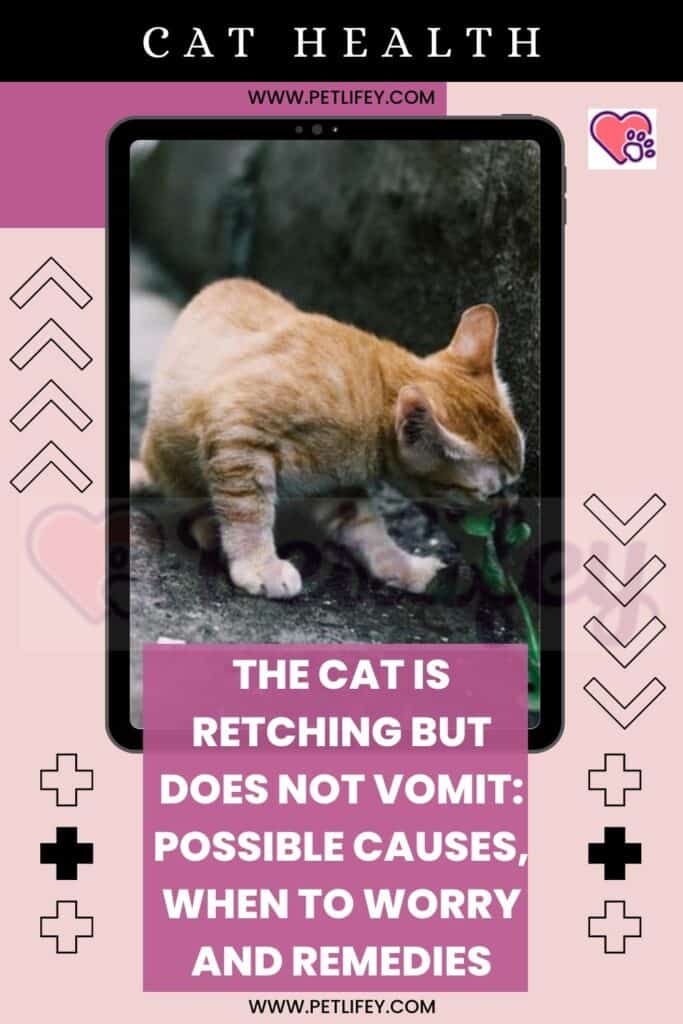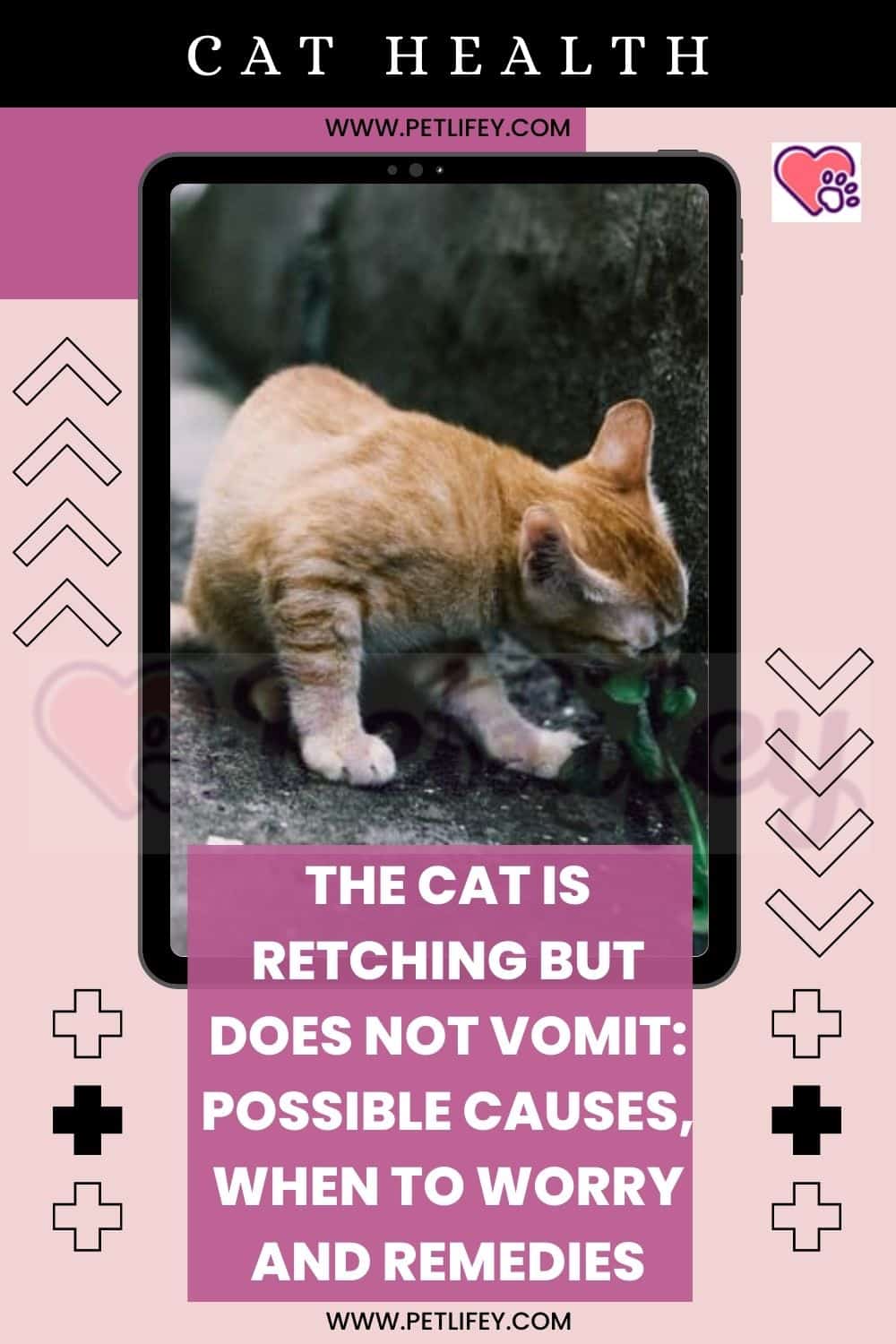The Cat is Retching But Does Not Vomit: Understanding Causes and When to Seek Help

When your cat begins retching but does not produce any vomit, it’s understandable to feel concerned. Retching can arise from a range of issues that are affecting your pet’s well-being. It’s a reflex action where the cat’s body appears to be trying to expel something from the stomach, but when nothing comes up, it indicates that vomiting isn’t completed, or something is preventing it. The action itself can be unsettling to witness, but it’s important to assess the situation carefully to determine the best course of action.
Different factors can lead to your cat exhibiting this behavior. Some causes might be rather benign, like the presence of hairballs that are common in cats due to their grooming habits. In these cases, retching could be an attempt to dislodge and expel hair from the stomach. However, it could also be a signal of more serious conditions such as gastrointestinal issues, respiratory difficulties, or foreign bodies stuck in the digestive tract. Observing your cat’s general behavior, appetite, and litter box habits can provide additional clues as to why retching is occurring without subsequent vomiting.
Knowing when to worry is crucial. If retching is an isolated incident, it may not be a cause for immediate concern. However, persistent or frequent retching accompanied by other symptoms like lethargy, changes in eating or drinking habits, or difficulty breathing necessitates a visit to the veterinarian. Your vet can help you pinpoint the cause and recommend remedies that may range from dietary changes to medication, ensuring that your cat’s stomach and overall health are managed properly.
Understanding Retching in Cats
Retching in cats can be a perplexing symptom, as it doesn’t always lead to vomiting yet signifies that your cat is experiencing discomfort. It’s important to know when this behavior is a harmless occurrence and when it warrants a visit to the vet.
Distinguishing Retching from Vomiting
Retching is characterized by the forceful attempt to expel contents from the stomach, often leading to a gagging sound and posture. In contrast, vomiting involves the actual expulsion of stomach contents. While retching can sometimes precede or accompany vomiting, it is possible for a cat to retch without producing any gastric material.
Causes of Retching Without Vomiting
Common causes for your cat’s retching include:
- Gastrointestinal inflammation: This can be due to a variety of reasons, from infections to allergies.
- Foreign objects: Your cat might have ingested non-food items that irritate the stomach lining.
- Hairballs: Accumulated hair in the digestive tract can stimulate retching.
Consider that some cats may also retch due to more serious issues such as obstructions or diseases like kidney failure.
Signs and Symptoms
Be observant for signs that accompany the retching:
- Cough: If retching is frequently followed by a cough, it may indicate a respiratory condition.
- Nausea: Signs like drooling or listlessness may be present if your cat is feeling nauseous.
If you notice that your cat is retching repeatedly without any vomit, it’s a sign that something is not right, and you should consult with a veterinarian.
Common Causes of Gastrointestinal Discomfort
When your cat experiences gastrointestinal discomfort, it’s often attributed to a few common factors, ranging from hairball accumulation due to grooming, dietary missteps, to the presence of intestinal parasites.
Hairballs and Grooming
Cats are meticulous groomers, and in the process, they ingest hair which can form hairballs. These hairballs may cause your cat to retch as they attempt to expel them from their stomach. Normally, hairballs are coughed up, but if your cat is retching without producing a hairball, it could indicate a blockage.
Dietary Indiscretions
Ingesting inappropriate food or sudden changes in diet can upset your cat’s stomach. Cats may experience gastrointestinal discomfort when they eat food that they’re not used to, or consume something toxic. It’s important to monitor what your cat eats and introduce new foods slowly to prevent stress on their digestive system.
Intestinal Parasites
Intestinal parasites can be a hidden cause of discomfort in your cat. Common parasites include roundworms, hookworms, and tapeworms, which can disrupt the normal function of the stomach and intestines. Regular deworming and fecal exams are crucial for maintaining your cat’s gastrointestinal health.
Medical Conditions Leading to Retching
Your cat’s retching can be distressing to witness and may be indicative of underlying medical conditions. Several specific diseases and health issues can lead to this symptom, revealing the need for veterinary attention and possibly urgent care.
Inflammatory Bowel Disease
Inflammatory Bowel Disease (IBD) is a group of disorders in your cat’s gastrointestinal tract characterized by chronic inflammation. Symptoms accompanying retching may include weight loss and lethargy. Diagnosis usually involves imaging such as X-rays or ultrasounds and may require biopsy. Treatment options typically consist of dietary management and medication to control inflammation.
Pancreatitis
Pancreatitis refers to inflammation of the pancreas. This condition can cause retching, along with other symptoms like lethargy and weight loss. Your vet may recommend blood tests or imaging to diagnose pancreatitis and treatment often involves fluid therapy, pain management, and nutritional support.
Hyperthyroidism
Hyperthyroidism occurs when your cat’s thyroid gland produces too much thyroid hormone, which can trigger symptoms like retching, weight loss, and increased appetite. Blood tests can diagnose this condition, and treatments may include medication, radioactive iodine therapy, or surgery.
Gastrointestinal Obstructions
Obstructions in the gastrointestinal tract, such as foreign objects or hairballs, can cause retching. This is often paired with a lack of appetite or difficulty defecating. Immediate veterinary care is crucial as obstructions might require surgical intervention to remove the blockage and alleviate the symptom.
When to Visit the Veterinarian
Recognizing when to seek veterinary care is crucial if your cat is retching but not vomiting. Ignoring persistent retching could lead to complications.
Assessment of Retching
Your veterinarian’s evaluation will determine if your cat’s retching is a symptom of a benign issue or something more serious. Persistent retching, especially without expulsion of vomit, warrants a visit to the veterinarian, as this could indicate an obstruction or other underlying condition that needs to be addressed.
Diagnostic Testing
Should your cat’s retching episodes continue, your veterinarian might recommend diagnostic tests. Tests may include:
- Blood tests: To assess overall health and organ function.
- X-rays or ultrasounds: To visualize any obstructions or anomalies within the gastrointestinal tract.
These tests are pivotal in diagnosing the cause of retching and formulating an appropriate treatment plan.
Emergency Signs
Immediate veterinary care is necessary if your cat exhibits signs such as:
- Persistent retching without producing vomit
- Signs of dehydration (dry gums, lethargy)
- Presence of blood in saliva or retching material
- Continuous retching for more than a day with no relief
Prompt attention to these emergency signs can be lifesaving and prevent further complications.
Treatment Options
When your cat is retching without vomiting, effectively addressing their discomfort requires appropriate treatment options. Depending on the cause, treatments can range from simple at-home adjustments to medical or surgical interventions.
Home Remedies
To manage mild cases of retching in cats, you can try several home remedies:
- Dietary Changes: Implement a bland diet temporarily, consisting of boiled chicken or white fish, which can be easier for your cat to digest.
- Hairball Remedies: For hairball-related retching, over-the-counter hairball pastes may help lubricate the digestive tract, allowing the hairball to pass.
Medical Treatments
If home remedies aren’t effective, consult your veterinarian. They may suggest:
- Medications: Depending on the diagnosis, medications such as anti-emetics to control nausea or anti-inflammatories to reduce gastrointestinal irritation might be prescribed.
- Dietary Adjustments: Your vet may recommend a special therapeutic diet to address underlying issues, like sensitivities or digestive problems.
Surgical Interventions
In more severe cases, especially when foreign objects are involved, surgery might be necessary:
- Foreign Body Removal: If your cat ingested an object causing blockage, surgical removal is usually the only option.
- Exploratory Surgery: For persistent, unexplainable retching, exploratory surgery may be required to find and address the root cause.
Prevention and Long-term Care
Preventing retching in cats entails a proactive approach to their diet and nutrition, consistent veterinary oversight, and careful management of any chronic conditions. By remaining vigilant in these areas, you can help ensure your cat’s well-being.
Diet and Nutrition
Your cat’s diet is foundational to its health. Feeding high-quality, well-balanced meals is the first step in preventing gastrointestinal upset. Be mindful of:
- Food allergies: Introduce new foods gradually and monitor for adverse reactions. If your cat shows signs of a food allergy, consult your vet for a tailored diet plan.
- Hairball control: Regularly grooming your cat and providing specialized hairball formula food can reduce the occurrence of hairballs, which are a common cause of retching.
Regular Veterinary Check-ups
Annual or bi-annual check-ups are crucial for catching issues early:
- Diagnostic screenings: Your vet can perform tests to rule out chronic diseases or gastrointestinal issues.
- Dental health: Dental problems can contribute to retching, so regular oral health assessments are necessary.
Managing Chronic Conditions
If your cat has a chronic condition, consistent management is key:
- Medication: Ensure your cat is taking prescribed medications correctly to control any underlying health issues.
- Monitoring: Keep a log of your cat’s symptoms and behavior to spot patterns indicating a problem.
By integrating these preventative and care strategies into your routine, you’ll be better equipped to keep your feline friend healthy and reduce instances of concerning symptoms such as retching.
Conclusion
Early intervention is pivotal in safeguarding your cat’s health. When your cat exhibits retching without vomiting, observe its behavior and frequency of the act. Consulting a veterinarian promptly can prevent potential complications.
As a knowledgeable pet owner, you play an active role in your cat’s well-being:
- Monitor: Keep a close eye on any additional symptoms or changes in behavior.
- Dietary Habits: Ensure your cat’s diet is suitable and free of any irritants.
- Environmental Checks: Remove any potential hazards that could be ingested by your cat.
Being an active participant in your cat’s health care routine means recognizing when to seek professional advice.
| Action | Purpose |
|---|---|
| Regular Check-ups | Maintains baseline cat health. |
| Immediate Vet Visit | Advised if retching persists or worsens. |
Remember, the timely response to health anomalies often results in better outcomes. Your proactive approach can make a significant difference in your cat’s quality of life.







